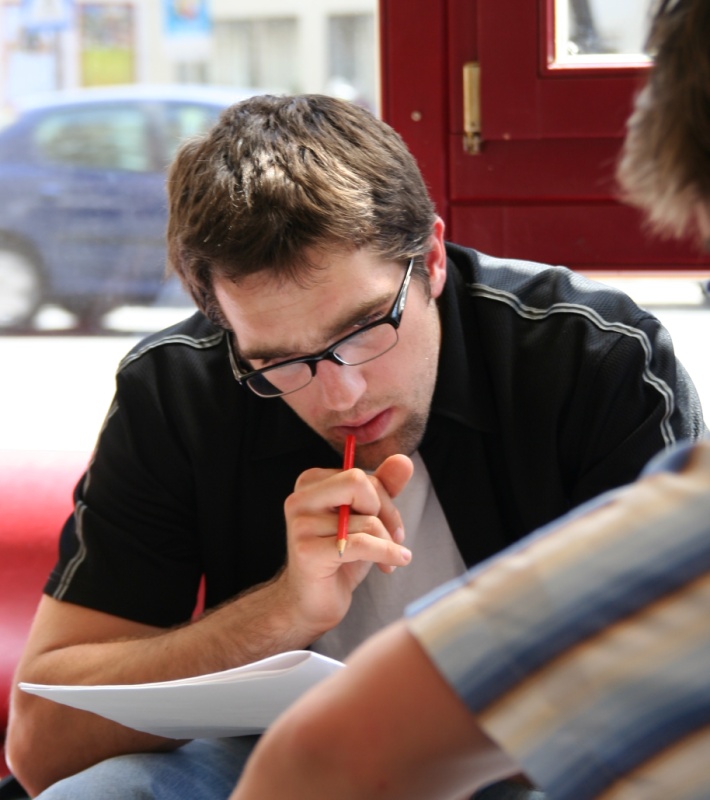Look at the following images. Do you remember in detail what you did yesterday? What did you do last weekend or last holidays?
Sometimes, it is difficult to put in order the activities we did in the past.
In this topic, you will read a story told by Mark. He’s telling us what he did in his last holidays in Albuquerque, New Mexico.
By the end of this topic you will:
• Use adverb phrases such as, last night, yesterday morning, last year, etc. to express past situations. Through short stories related to cultural habits and leisure.
Read and listen to the story.
“Oh, yes. Last year I went to Balloon Park, to watch the 4th of July celebration in Texas.”
“Is Balloon Park in Texas, Mark?”
“I’m pretty sure it is, yeah!”
“I’m sorry, Mark. It’s not in Texas. It’s in Albuquerque, New Mexico”
“Oh, Yes. How could I forget?”
“What day is it today, Mark?”
“Oh, officer, it’s… it’s 5th or 6th of July? I’m not sure. But last week I was in Albuquerque, in El Paso.”
“Mark, El Paso is in Texas, not in Albuquerque.”
“Oh, yes, ma’am. I went to Santa Fe and then to, to, to El Paso to see some friends of mine. Or was it last night?” Sorry, I can’t remember.”
“Mark, your sister says you were at home last week, and you were at home last month. In fact, you were at home, in Santa Fe, last year, too. Where are we, Mark?”
“Oh, ma’am. We’re, we’re, we’re at an asylum, in New York City. It’s 3:30 p.m.
“Yes. What year is it?”
“It’s 2016, ma’am. I went nowhere last year. But I prefer the fantasy of being at Balloon Park with my friends from Mexico, the Pumas. I remember we ate Christmas Enchiladas at the University of New Mexico. We also climbed Sandia Mountain, went to the Route 66 festival, and shopped at Coronado mall in the summer.”
“I understand, Mark.”
“Do you, ma’am, or, officer?”
“Doctor. Doctor Crosby. And yes, I understand.”
“Thank you, Doctor. So, will you let me go now?
“I’m afraid I can’t now. Only if you stop fantasising and focus on reality…”

Casimiro, S. (2017) Balloon above Albuquerque [photo]
After listening to Mark and Doctor Crosby’s conversation, read the next sentences.
An adverb phrase is an expression consisting of one or more words to express time in general. For example, seasons: in the spring, parts of the day: in the evening, a time before: two days ago, three weeks ago, last year, specific time: at 6 p.m., from twelve to two, etc.
In this topic, Mark and Doctor Crosby use adverb time expressions to express past actions at a specific time.
Adverb phrases (of time): seasons
Example:
In the spring I went to Canada.
How many seasons are there in the year?
There are four seasons in a year: spring, summer, fall and winter. Remember that in American English we say “ in the + SEASON” to refer to a specific period.
Note: In British English, we say “in the autumn” instead of “in the fall”..
Remember that three months correspond to one season. When we say:
In the spring, meaning from March to May.
In the summer, meaning from June to September.
Note: We write the months in capital letters.
Seasons |
Months |
In the spring |
March to May |
In the summer |
June to September |
In the fall |
October to December |
In the winter |
January to March |
Attention! Never “ |
|
To practice what we just learned about seasons, do the following exercise.
Can we express time differently? Are there any other adverb phrases of time?
We can express time by using adverb phrases of parts of the day. Pay attention to the following examples.
What did you do yesterday at 12:00? = What did you do yesterday at noon?
In general, with specific time we use “AT”.
What did you do in the afternoon? We use “in the” with periods of time.
Remember:
AT + specific time
Example
At midnight, we went clubbing. (12 a.m.)
IN THE + period of time
Example
In the evening, we climbed Sandia Mountain. That was amazing! (Between 6 p.m. and 8 p.m.)
FROM + a specific period in hours or days.
Example
From 6 to 8; from Monday to Friday
In the morning |
Before 12:00 O’clock p.m. |
At noon |
At 12:00 o’clock p.m. |
In the afternoon |
After 12:00 o’clock, to 18:00. |
In the evening |
After 18:00 to 20:00 hrs. |
At night |
After 20:00 to 00:00. |
At midnight |
00:00 hrs. |
When we want to express the number of units of time passed (days passed, the number of hours passed), we use the word “ago” after the number of units.
Examples:
What did you read three days ago?
Where were you an hour ago?
Did you take a holiday three years ago?
Were you on holiday three weeks ago?
Did you go to San Francisco four months ago?

Koppensteiner, C. (2005) Thinking [photo] Retrieved on 2017, March 30 from https://www.flickr.com/photos/caramdir/21288093/sizes/o/
We have reviewed Adverb Phrases in different situations to express time. Now let's tests your skills by doing the following activities.
Activity 1
Can you remember in detail what you did at a specific time? Sometimes, when we have a terrible memory. So, we use calendars, planners, or reminders in our mobile phones to remember our past activities.
Following the story, read this new conversation between Mark and Doctor Crosby. Identify the Adverb Phrases used here to find out about Mark’s activities.
Activity 2
How often do you record your voice to keep a diary of a given moment? When you have a lot of ideas or when you want to remember the details of a specific time, voice recorders are of great help. Nowadays, mobile phones have this kind of friendly apps.
You will now hear Dr Crosby’s report about Mark’s visitors.
Pay attention to the adverb phrases she uses, these will help you do this activity more easily.
Activity 3
Have you ever told or written about your holiday in detail as Mark did?
When you tell your friends or relatives about your holiday, you could get confused about the order of your activities.
Imagine, last week you got lost looking for a restaurant in Albuquerque. You wanted to eat Christmas Enchiladas. Type “Albuquerque” on your browser and find some good restaurants.
Here you will write a short fiction story about looking for Christmas Enchiladas in Albuquerque. You will use adverb phrases.
Remember to put the main activities in chronological order before writing your story. It is better this way. You can also answer the following questions, so it is easier to write your story.
Questions:
What did you do in the morning, at noon, in the afternoon, in the evening, the following day, and two days later?
What did you do the day before, two days ago, last week?
Your text must be written in 80-100 words. Consider the following aspects for your evaluation:
Then, review your document with the next rubrics and compare it to this example.
Activity 4
So far we have seen different ways in which Mark and Doctor Crosby use adverb phrases in the story. You have surely used adverb phrases, too, not only in stories or holidays but also in everyday life events.
In this task you will describe some activities you did recently, using the adverb phrases studied here. It is easier if you answer 3-5 of the following questions:
Write the ideas or the answers you have for these questions. When you finish, organise it by points because you are going to record your voice. Consider answering 3-5 questions. Your recording must last 1-1:30 minutes. Following the rubrics essential. Then compare your recording to this example provided.
In English, adverb phrases are essential to determine when events happened. So, we can tell stories such as these two characters. Learning vocabulary will enable you to provide more details and make it more beautiful.
Did Mark get cured? See what happened to these two people who have surprised us with their actions. Read last part of the story and do the required activity.
Azar B and Azar B. (1999) Fundamentals of English Grammar. 2nd. Ed., U.S.A.: Prentice Hall
Murphy, R. (2015) Essential Grammar in Use. 4th Ed., Cambridge: Cambridge University Press.
Azar, B. and Hagen, S. (2011) Fundamentals of English Grammar. 4th edition. U.S.A.: Pearson Longman
Eckstut, S. (2003) Focus on Grammar Workbook: An introductory course for reference and practice, N.Y.: Longman.
Moya, J. (S.F.) Basic English Grammar: Structures and Vocabulary. Chile: Instituto Geográfico Militar.